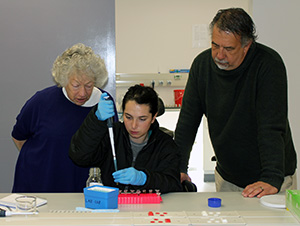Latest News Archive
Please select Category, Year, and then Month to display items
04 October 2024
|
Story Dr Cindé Greyling
|
Photo Supplied
 Scan the QR Code to unlock 30 days of exciting challenges to enhance your mental well-being.
Scan the QR Code to unlock 30 days of exciting challenges to enhance your mental well-being.
During October this year, the University of the Free State (UFS) Department of Student Counselling and Development (SCD) invites all staff and students to play an active part in their own mental health. Every day. You can do one small thing each day to improve your mental health. That is why the campaign is called DoDay – do something today and make it a do
day.
For 30 days, doable mental health activities will be shared on the UFS and SCD Instagram and Facebook pages. You will be invited to participate in the activity and to share your experience online. We encourage you to take up the challenge and share the skills for better mental health.
Be successful
As we approach the mid-year exam when staff and students are experiencing added pressure and anxiety, it is the perfect time to dedicate 10 to 15 minutes daily to your mental health. Each week we will focus on five different mental health building blocks: social wellness, emotional wellness, intellectual wellness, physical wellness, and spiritual wellness. By participating in the different activities each day, you will cover all the different wellness areas.
Be informed
During the campaign, we will also release insightful podcast interviews with experts who share their personal and professional experiences with each wellness area. It is no secret that communities are stronger together. Let us all work towards collectively improving our mental well-being and supporting one another on this journey.
Be happy
Improved mental health supports your professional and academic performance. It also helps you to make better decisions and enjoy life more. Improving your mental well-being has never been easier than following the DoDay calendar. You will receive clear guidelines on what to do each day, and you can mark off your progress and share your activities as you go.
Be a DoDay-er
Remember that maintaining mental well-being is like brushing your teeth, so we recommend it daily! Join the UFS Mental Health DoDay drive and take one small daily action for 30 days towards better mental health. Download your 30-day DoDay calendar – and remember to share and inspire others. Make every day a Mental Health DoDay
Monkey research attracts international attention
2016-07-11

Prof Trudy Turner from the University of
Wisconsin-Milwaukee and Prof Paul Grobler
from the Department of Genetics at the
University of the Free State, together with one
of the students researching monkey genes.
Photo: Siobhan Canavan
For this year’s Summer School programme, Prof Paul Grobler, from the University of the Free State Department of Genetics focuses on research about the conflict between monkeys and humans in areas where monkeys are regarded as problem animals.
Global expert part of research
This year, Prof Grobler is hosting a group of students and lecturers from the United States of America (USA). The group includes Prof Trudy Turner from the University of Wisconsin-Milwaukee (UWM), a global expert on vervet monkeys. She has been working with the Department of Genetics at the UFS for the past fifteen years, and has also been appointed as an Affiliated Professor in the department.
“The Summer School programme is an opportunity for the American Primatology students to gain practical experience in Africa,” says Prof Grobler.
International interest in Summer School
This year’s Summer School programme involves four lecturers and nine students. The lecturers are from the University of Wisconsin-Milwaukee (UWM), the University of California, Los Angeles (UCLA), Boston University, and Central Washington University.
“We use the genetic information to determine
how monkeys historically infiltrated the
different areas in South Africa.”
This year’s focus is on the genetic structure of the monkeys in South Africa, and research that is being done on the differences and similarities in monkeys from different areas. “We use the genetic information to determine how monkeys historically infiltrated the different areas in South Africa,” says Prof Grobler.
Local nature reserve acting as host
The group will perform field work, including observing monkeys in the Soetdoring Nature Reserve, as well as laboratory work in the department, where they will be assisted by two laboratory technicians.
Two years ago, Prof Grobler and his department tested this idea on a smaller scale, and now they hope to make this a regular event.